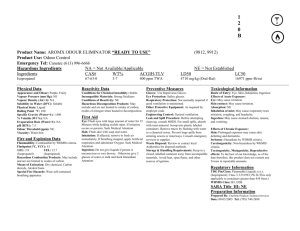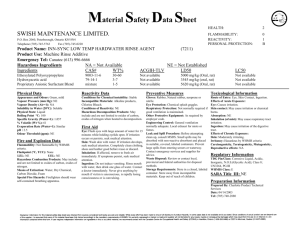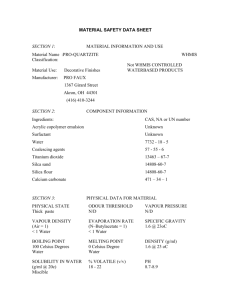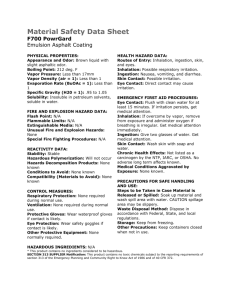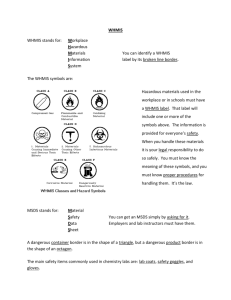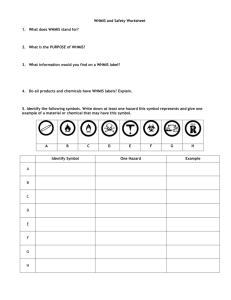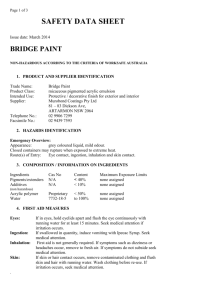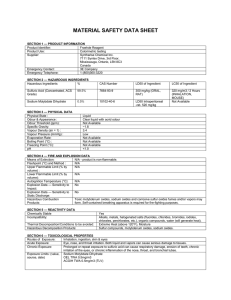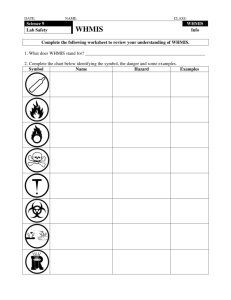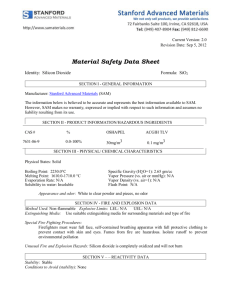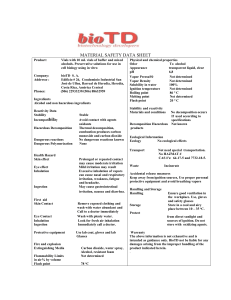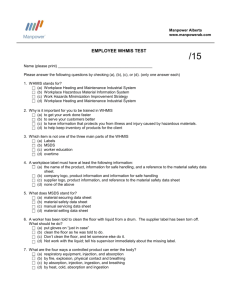9806 RTU - Swish Maintenance Limited
advertisement
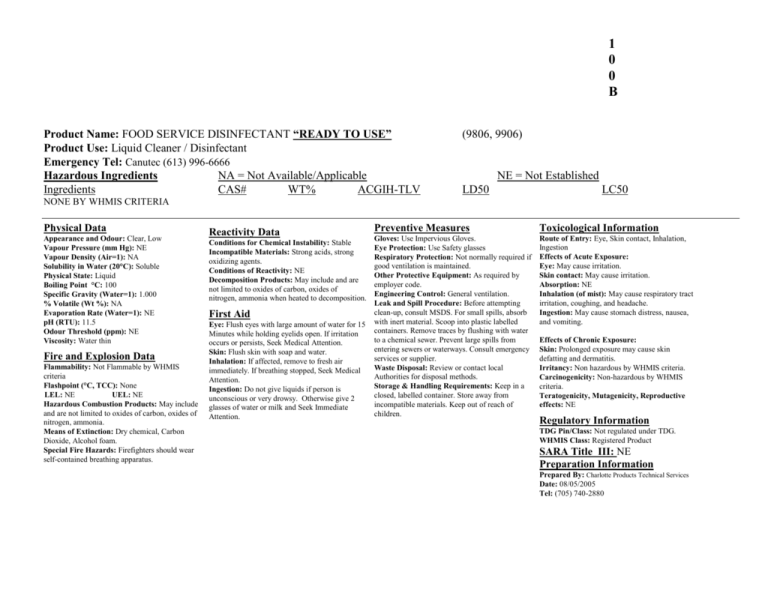
1 0 0 B Product Name: FOOD SERVICE DISINFECTANT “READY TO USE” Product Use: Liquid Cleaner / Disinfectant Emergency Tel: Canutec (613) 996-6666 Hazardous Ingredients NA = Not Available/Applicable Ingredients CAS# WT% ACGIH-TLV (9806, 9906) NE = Not Established LD50 LC50 NONE BY WHMIS CRITERIA Physical Data Appearance and Odour: Clear, Low Vapour Pressure (mm Hg): NE Vapour Density (Air=1): NA Solubility in Water (20°C): Soluble Physical State: Liquid Boiling Point °C: 100 Specific Gravity (Water=1): 1.000 % Volatile (Wt %): NA Evaporation Rate (Water=1): NE pH (RTU): 11.5 Odour Threshold (ppm): NE Viscosity: Water thin Fire and Explosion Data Flammability: Not Flammable by WHMIS criteria Flashpoint (°C, TCC): None LEL: NE UEL: NE Hazardous Combustion Products: May include and are not limited to oxides of carbon, oxides of nitrogen, ammonia. Means of Extinction: Dry chemical, Carbon Dioxide, Alcohol foam. Special Fire Hazards: Firefighters should wear self-contained breathing apparatus. Reactivity Data Preventive Measures Gloves: Use Impervious Gloves. Conditions for Chemical Instability: Stable Eye Protection: Use Safety glasses Incompatible Materials: Strong acids, strong Respiratory Protection: Not normally required if oxidizing agents. good ventilation is maintained. Conditions of Reactivity: NE Other Protective Equipment: As required by Decomposition Products: May include and are employer code. not limited to oxides of carbon, oxides of Engineering Control: General ventilation. nitrogen, ammonia when heated to decomposition. Leak and Spill Procedure: Before attempting clean-up, consult MSDS. For small spills, absorb First Aid Eye: Flush eyes with large amount of water for 15 with inert material. Scoop into plastic labelled containers. Remove traces by flushing with water Minutes while holding eyelids open. If irritation to a chemical sewer. Prevent large spills from occurs or persists, Seek Medical Attention. entering sewers or waterways. Consult emergency Skin: Flush skin with soap and water. services or supplier. Inhalation: If affected, remove to fresh air Waste Disposal: Review or contact local immediately. If breathing stopped, Seek Medical Authorities for disposal methods. Attention. Storage & Handling Requirements: Keep in a Ingestion: Do not give liquids if person is closed, labelled container. Store away from unconscious or very drowsy. Otherwise give 2 incompatible materials. Keep out of reach of glasses of water or milk and Seek Immediate children. Attention. Toxicological Information Route of Entry: Eye, Skin contact, Inhalation, Ingestion Effects of Acute Exposure: Eye: May cause irritation. Skin contact: May cause irritation. Absorption: NE Inhalation (of mist): May cause respiratory tract irritation, coughing, and headache. Ingestion: May cause stomach distress, nausea, and vomiting. Effects of Chronic Exposure: Skin: Prolonged exposure may cause skin defatting and dermatitis. Irritancy: Non hazardous by WHMIS criteria. Carcinogenicity: Non-hazardous by WHMIS criteria. Teratogenicity, Mutagenicity, Reproductive effects: NE Regulatory Information TDG Pin/Class: Not regulated under TDG. WHMIS Class: Registered Product SARA Title III: NE Preparation Information Prepared By: Charlotte Products Technical Services Date: 08/05/2005 Tel: (705) 740-2880
